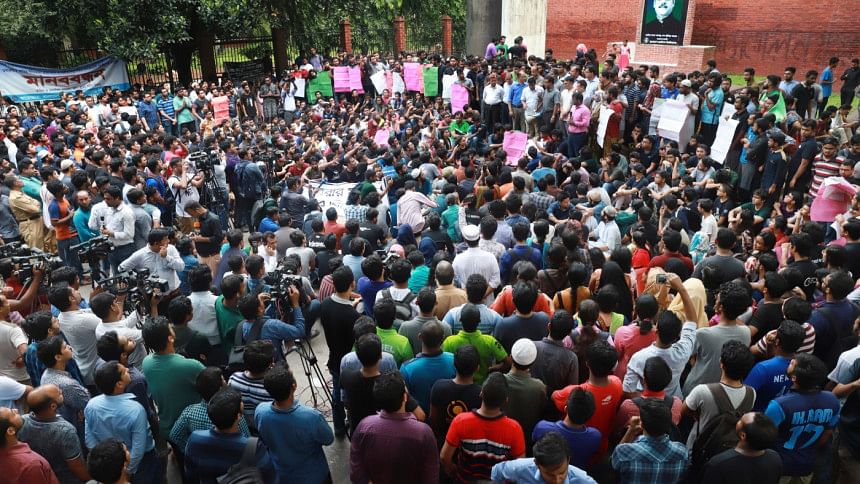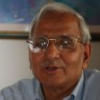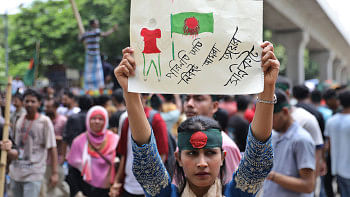Politics of Exploitation

On October 11, the Buet VC announced that student and teacher politics would be banned at the university. The announcement followed days of protest and a nationwide outcry at the brutal killing of Buet student Abrar Fahad by Chhatra League activists. Buet protesters had said they would continue their shutdown of the university, Bangladesh's most prestigious, until the VC agreed to their 10 conditions, including the ban on student politics.
The prime minister said last week that each university would have to make its own determination on banning student politics but that she would not support banning student politics nationwide. Some other political figures have similarly come out against a blanket ban.
Yet, the sentiments of most citizens of Bangladesh are against party-backed student politics, which exploits students at our public universities for the parties' own selfish ends. The law is also against it: the Parliament has already made party-affiliated student politics in educational institutions illegal. (Incidentally, it also made the foreign branches of political parties illegal.)
In 2008, following dialogues held by the Election Commission [EC] with political parties, civil society and journalists in 2007, sections 90B and 90C, relating to registration of political parties, were included as an Ordinance in the amended RPO. The Ninth Parliament, in its first session, duly ratified the Ordinance, making it into law. Ironically, some of the individuals opposing Buet's decision to ban student and teacher politics were members of the very Parliament that passed the RPO amendments in 2009.
Section 90B(1)(b)(iii) of The Representation of People Order, 1972 (RPO), the main electoral law of Bangladesh, states that for any political party to be registered, its constitution must include, among others, "specific provisions...to prohibit formation of any organisation or body as its affiliated or associated body [consisting of] the teachers or students of any educational institution or the employees or labourers of any financial, commercial or industrial institution or establishment or the members of any profession: Provided that nothing shall prevent them from organising independently in their respective fields or forming association, society, trade unions etc. and exercising all democratic and political rights, and individual, subject to the provisions of the existing laws, to be a member of any political party."
It is clear then that the formation of student wings of political parties, like Chhatra League and Chhatra Dal, are prohibited by law. However, the law does not by any means abrogate students', teachers' or labourers' right to political expression, as explicitly stated in the second half of the paragraph: "provided that nothing shall prevent them from organizing independently."
So the decision of Buet authorities in essence puts into effect a law that should have been implemented long ago. If it had, deaths like Abrar Fahad's may have been prevented. The selfishness of our political parties and inaction of our EC have created an environment in which the excesses of student politics have been allowed to flourish with tragic results.
How did political parties circumvent the law passed by Parliament in 2009? By playing games. The parties removed from their respective constitutions the provisions regarding associated and affiliated bodies, and called their existing student and labourer wings "brotherly" organisations—while exercising full control over them, including designating their leadership.
So despite the widespread political consensus and dialogue held by the EC between concerned stakeholders (i.e. political parties, civil society and journalists) from which the law passed by Parliament in 2009 emerged, the parties refused to follow the intent of the law—the ban of student and teacher politics. Business as usual was allowed to continue, growing more corrosive over time.
The student politics, as is practiced today, is a politics of exploitation. Political parties use students as their henchmen to provide "street power". Rather than students engaging in activities in the interest of students through organically grown organisations, student politics exists to cater to the interests of the parent organisations. They are not independent, neither financially nor operationally; they are run by the dictates of the political parties backing them. It is based on a patronage system: Student wings are "clients" of political parties, acting in service of their "patrons", and receiving support and benefits in return. Such patronage, especially by the ruling political party, allows members of its student wing to engage in almost every kind of illegal activity with impunity, often with the support of partisan teachers. In this way, our political parties have essentially "weaponised" the student politics on our campuses, as we have seen at Buet.
Clearly, the cost of this defiance of the law, passed by the Parliament, has been very high. Student and teacher politics has poisoned the academic environment of our public universities and turned them into dens of hooliganism and violence, in violation of the Penal Code, which in its Section 153B prohibits any words or actions that "induce or attempts to induce any student or any class of students, or any institution interested in or connected with students, to take part, in any political activity which disturbs or undermines, or is likely to disturb or undermine, the public order". Punishment for violations is up to two years imprisonment—but, again, no action is taken against those who flex muscles and otherwise break laws in our campuses because of the entrenched patron-client relationship.
The defiance of the RPO and the violations of the Penal Code have turned our students into monsters and killers. Since independence, we have seen 151 killings in various campuses, the latest being Abrar Fahad's. Thus, the death of Abrar is primarily the result of the lack of rule of law, which created a culture of impunity not only in Buet campus, but also throughout Bangladesh.
To conclude, bans on student and teacher politics alone by university authorities will not stop violence and other illegal activities on campus. Political parties must commit to stop, directly or indirectly, affiliating with and supporting and patronising student and teacher politics on our campuses. They must also bring an end to the confrontational politics, which causes intolerance and hate for those holding opposing views. In addition, they must commit to ending the culture of impunity and ensuring rule of law. Most importantly, the EC must wake up to its responsibility to enforce the provisions of RPO. Would it?
Dr Badiul Alam Majumdar is Secretary, SHUJAN: Citizens for Good Governance.

 For all latest news, follow The Daily Star's Google News channel.
For all latest news, follow The Daily Star's Google News channel. 



Comments